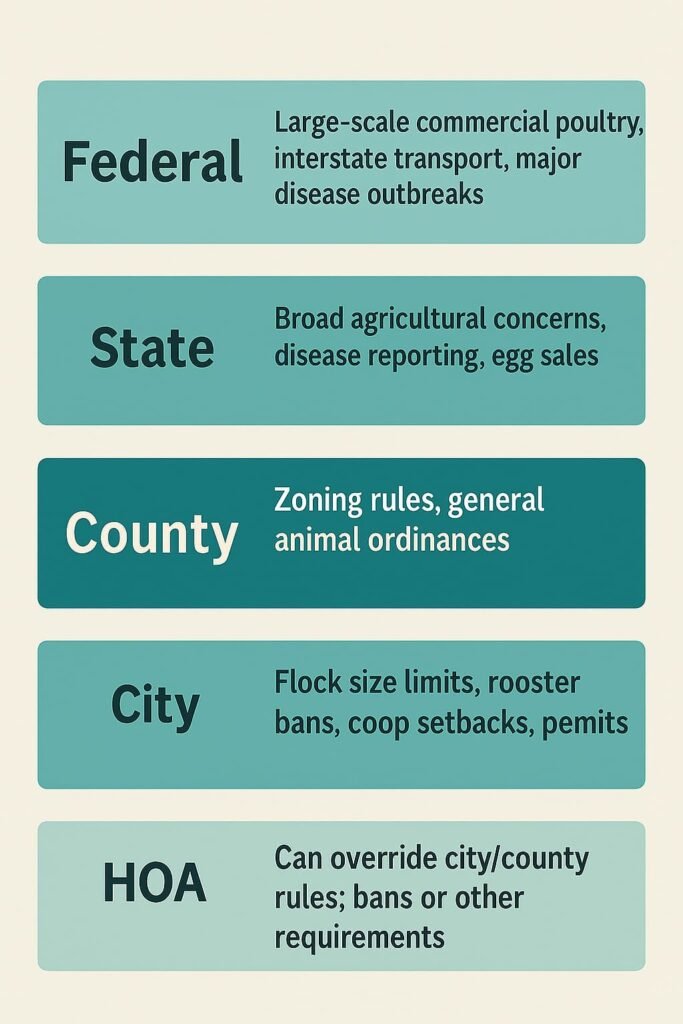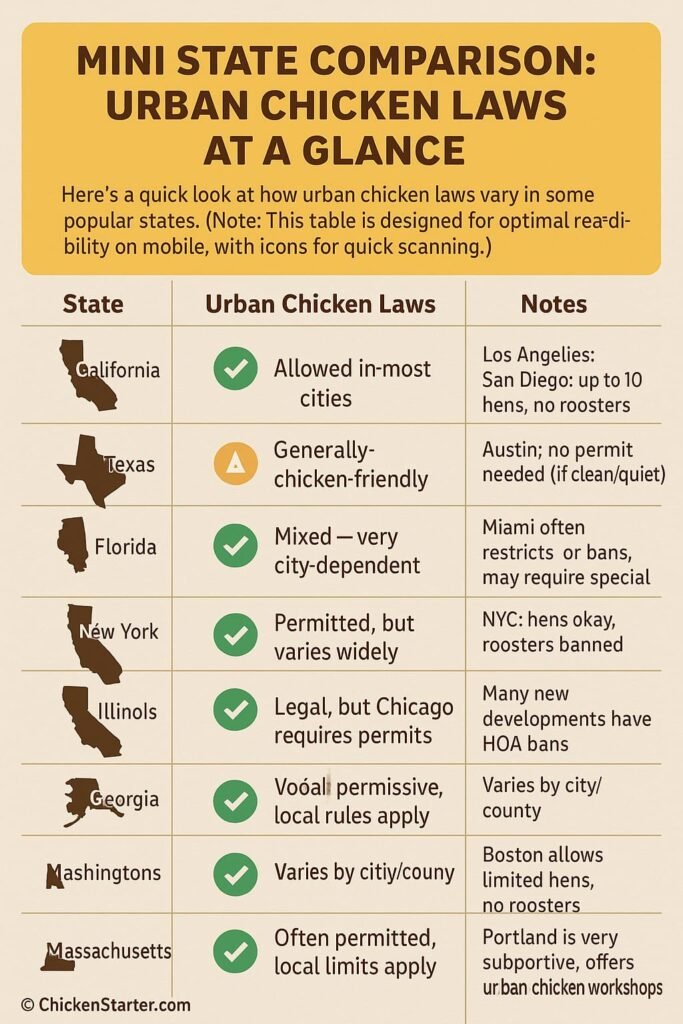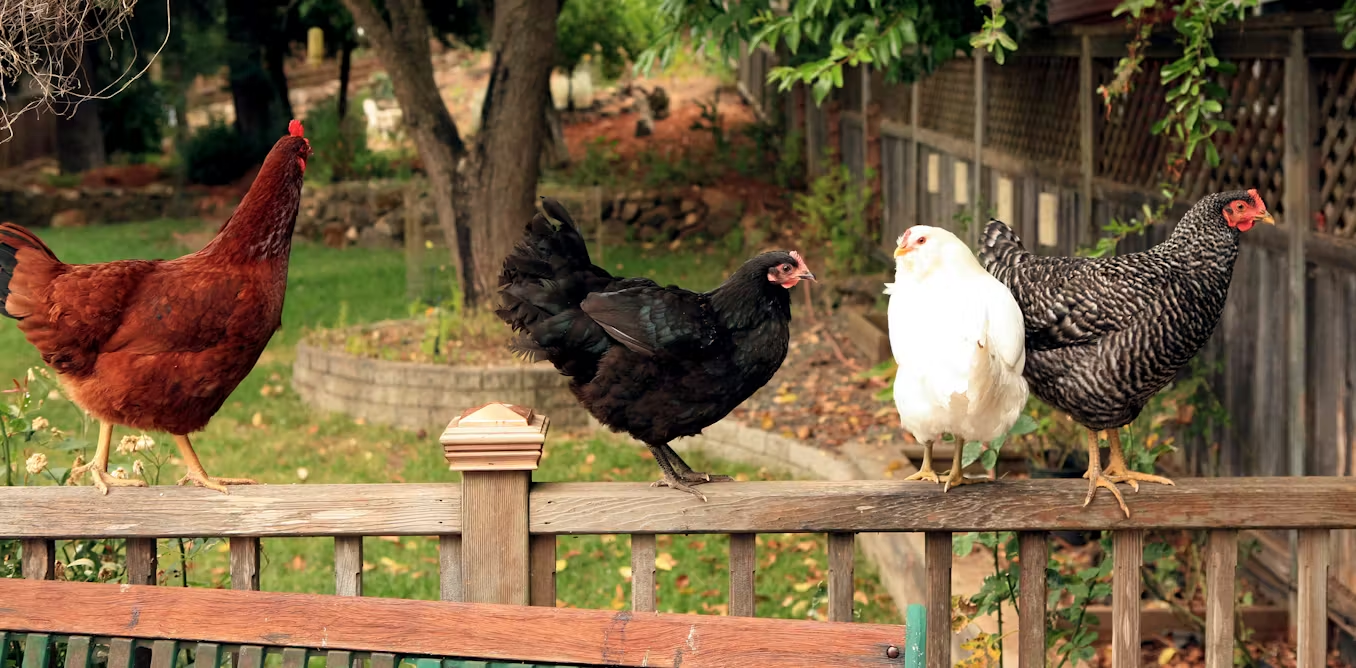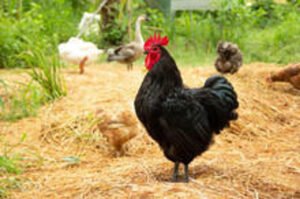Dreaming of fresh backyard eggs and happy clucking? I get it! Backyard chickens are booming across the U.S., from California’s urban homesteaders to Texan suburban coops. But chicken legality isn’t uniform — while New Yorkers might need to skip the rooster, a neighbor in Austin may enjoy a free-range flock with minimal red tape. With roughly 11 million households now enjoying these feathered friends, this hobby has exploded. It’s a great way to boost self-sufficiency, connect with nature, and frankly, chickens are surprisingly endearing.
But before your first fluffy chick arrives, a critical question: Can you raise chickens where you live—specifically, in your town and neighborhood? It’s not a simple state-wide rule. The laws that truly matter are hyper-local. Finding them can feel like a scavenger hunt; municipalities sometimes make it a puzzle, just for fun.
Quick Answer: Can You Have Backyard Chickens?
TL;DR: Probably, but it’s complicated! The legality of keeping backyard chickens almost entirely depends on your specific city or county ordinances and, crucially, your Homeowners’ Association (HOA) rules. State laws offer broad guidelines but rarely dictate specifics like flock size or rooster bans for residential properties. You must check your local municipal code and HOA bylaws first.
Decoding Chicken Laws: Can You Raise Chickens in Your Area?
The Rise of Backyard Chickens: A National Trend
Backyard chickens are soaring in popularity. People seek fresh, organic food, reduced carbon footprints, or simply the joy of raising animals. It’s a move toward sustainable living, offering benefits like pest control, natural fertilizer, and delicious eggs. What’s not to love?
This trend is strong across the US. Communities are embracing or grappling with urban and suburban poultry. It’s a shift: chickens from farm animals to regulated backyard companions. This isn’t a fleeting trend; it’s a growing movement rooted in self-reliance and healthier living.
Understanding the Layers of Chicken Laws That Impact You
For a small backyard flock, city and county ordinances are almost always more important than state laws. Think of it as a legal funnel leading to specific answers:
| Legal Layer | What It Typically Controls for Backyard Chickens |
|---|---|
| Federal | Large-scale commercial poultry, interstate transport, major disease outbreaks (less common for backyard) |
| State | Broad agricultural concerns, disease reporting, egg sales (cottage food laws) |
| County | Zoning rules, general animal ordinances (especially outside city limits) |
| City | Flock size limits, rooster bans, coop setbacks, permits (most common source of rules!) |
| HOA | Can override city/county rules; specific bans or detailed restrictions on animals/structures |
- Federal Laws: Primarily cover large-scale commercial poultry, interstate transport, and disease. For backyard hobbyists, these rarely apply unless selling eggs across state lines or facing a major disease outbreak. The federal government defers local nuances to local governance, making your local focus paramount.
- State Laws: Address broad agricultural concerns, disease reporting, or “cottage food” laws for egg sales. They rarely dictate hen limits on a quarter-acre lot. For example, Ohio requires a poultry health certificate if you’re importing birds from out of state. Minnesota has detailed biosecurity rules under its Board of Animal Health. New York includes chickens under its general agriculture and markets law but typically leaves residential flock specifics up to local governments.
- County and City Ordinances: This is where rules get detailed. Your city or county council sets specific regulations for residential poultry. Ordinances vary wildly, even within the same state. Some cities ban chickens entirely, while others allow limited flocks with permits. For instance, Los Angeles, CA allows up to 10 hens per household—but no roosters—while Austin, TX permits chickens with few restrictions if they’re kept clean and quiet. Meanwhile, Miami, FL imposes tighter urban limits, often requiring a special use permit. Chicago, IL allows backyard chickens but requires a permit and has coop location rules. In contrast, Portland, OR is famously chicken-friendly, even offering city workshops on urban chicken keeping. Some are very specific, like El Mirage, AZ’s chicken ordinance, which limits to “no more than six chickens… at least 20 feet from neighboring properties.” You’ll find these rules in zoning codes, animal control ordinances, and health/safety laws.
- HOA Bylaws: The most localized, often most restrictive layer. If your community has an HOA, their rules are legally binding and can override city or county allowances. In states like Arizona and Colorado, many new developments include HOAs that strictly prohibit poultry. As Emily Shoop, a poultry educator with Penn State Extension, notes, “It’s extremely important to make sure you are legally allowed to keep them. Laws will vary in states, counties, and communities. There may be restrictions on how many chickens can be kept, where they can be kept, and whether a rooster is allowed to be part of your flock.”
My own journey taught me this: hours sifting through state agricultural sites only to find the real rules buried in my city’s municipal code. It was a classic case of looking for the forest when I needed the trees.

Mini State Comparison: Urban Chicken Laws At a Glance
Here’s a quick look at how urban chicken laws vary in some popular states. (Note: This table is designed for optimal readability on mobile, with icons for quick scanning.)
| State | Urban Chicken Laws | Notes |
|---|---|---|
| California | ✅ Allowed in most cities | Los Angeles, San Diego: up to 10 hens, no roosters |
| Texas | ✅ Generally chicken-friendly | Austin: no permit needed (if clean/quiet) |
| Florida | ⚠️ Mixed — very city-dependent | Miami often restricts or bans, may require special permits |
| New York | ✅ Permitted, but varies widely | NYC: hens okay, roosters banned |
| Illinois | ✅ Legal, but Chicago requires permits | Coop distance rules apply |
| Arizona | ✅ Allowed, but HOA restrictions common | Many new developments have HOA bans |
| Georgia | ✅ Generally permissive, local rules apply | Varies by city/county |
| Washington | ✅ Most cities allow, with limits | Seattle: up to 8 hens, no roosters |
| Massachusetts | ✅ Often permitted, local limits apply | Boston allows limited hens, no roosters |
| Oregon | ✅ Famously chicken-friendly, local limits apply | Portland is very supportive, offers urban chicken workshops |

Key Local Chicken Regulations
As you research, here are common regulations to check. These details make or break your chicken dreams:
- Zoning and Property Type: Local zoning defines how land can be used. Residential zones are often stricter for animals, while agricultural zones are more permissive. Some municipalities require a minimum acreage (e.g., 1 acre). Violating zoning can lead to immediate shutdown orders.
- Flock Size Limits: Most urban and suburban areas limit hens, typically 3 to 6 for standard lots. This sweet spot allows fresh eggs without overwhelming smaller properties. Larger properties or agricultural zones might allow more. These limits manage potential nuisance issues.👉 Considering your flock size? The number of chickens you need for a family depends on your egg consumption goals. Learn how many chickens are ideal for a family of 4. →
- Rooster Prohibitions: Almost universally, roosters are a big no-no in urban and suburban areas due to their loud, all-day crowing which can lead to complaints and code violations. Unless you’re rural, expect a “no rooster” rule. If a “sexed” chick turns out to be a rooster, you’ll need a plan for rehoming or processing.
- Coop and Run Requirements: Your coop isn’t just a home; it’s a structure needing compliance. These rules protect everyone:
- Minimum Setbacks from Property Lines: Distances your coop must be from property lines, neighboring homes, and even your own dwelling. Some cities require 25 feet from adjacent structures. These minimize odor and noise impact.
- Required Size for Coops and Runs: Minimum square footage per bird: 3-4 sq ft indoors and 10 sq ft outdoors. Adequate space prevents stress, pecking, and disease.
- Construction and Sanitation Guidelines: Coops must be predator-proof, weatherproof, and well-ventilated. Use solid materials (wood, metal, plastic) with hardware cloth (not just chicken wire!). Coops and runs must be clean, dry, and odor-free. Waste must be removed regularly.
- Permits, Licenses, and Fees: You might need permits. Some cities require a specific license to keep backyard chickens, often with an annual renewal fee. For new, larger coops, you might need a building permit. Some permits may require an inspection. Always ask your local planning or animal control department if any permits are needed.
Essential Practices for Responsible Chicken Keeping in Your Area
Beyond legal compliance, responsible keeping means being a good neighbor and protecting your flock. Be a great chicken ambassador!
Neighbor Relations: Avoiding Nuisance Complaints in Your City or County
Even if chickens are legal, neighbor complaints sour the experience. Be proactive!
- Talking to Your Neighbors: Before chickens arrive, chat with close neighbors. Address concerns. Offering them fresh eggs once your hens start laying builds goodwill.
- Managing Noise and Odor: Choose quiet hen breeds. Without roosters, hens make pleasant, low clucking sounds. A clean coop doesn’t smell bad. Regular cleaning, proper ventilation, and composting manure prevent issues. Store feed in sealed containers. Proactive odor control keeps your yard pleasant.
Health, Sanitation, and Waste Management: Keeping Your Flock and Community Safe
A healthy flock means a healthy environment. It’s a rewarding responsibility.
- Maintaining Coop Cleanliness: Daily spot cleaning and regular deep cleaning (weekly/bi-weekly) of coop/run prevent disease/odors. Learn more about best management practices for poultry litter from university extensions.
- Proper Manure Disposal: Don’t just pile it up. Many areas require composting or disposal in sealed, fly-tight containers. Composted chicken manure is black gold for your garden! Proper disposal prevents odors, flies, and runoff.
- Implementing Biosecurity Measures: Protect your flock from diseases. Prevent contact with wild birds (e.g., covered runs), quarantine new birds, and always provide fresh, clean water. Your local Health Department may have guidelines. Find more about biosecurity basics for backyard and small poultry flocks from Purdue Extension.
Predator Control: Protecting Your Chickens in Your Location’s Environment
The US has various chicken predators: raccoons, foxes, hawks, even domestic dogs. A secure coop and run are paramount. Losing a bird to a predator is heartbreaking.
- Hardware Cloth: Use 1/2″ hardware cloth for all openings/windows. Chicken wire keeps chickens in, not predators out. This small mesh prevents clever paws and strong teeth. It’s non-negotiable!
- Bury Skirts: Extend fencing/hardware cloth underground (12-18 inches) around the perimeter of the run to prevent digging predators.
- Secure Locks: Raccoons are clever; use carabiners or predator-proof latches. Standard latches are no match.
- Covered Runs: Overhead netting or solid roofs protect against aerial predators like hawks.
My experience: underestimating predators is a common rookie mistake. Investing in robust protection upfront saves immense heartache.
Selling Eggs: Understanding Cottage Food Laws Where You Live
If selling extra eggs, you’ll find state-level “cottage food laws” or “farm-to-consumer” regulations. These vary, so don’t assume you can just set up a roadside stand!
- Exemptions: Many states exempt small producers (e.g., under 1,000 birds annually) selling directly to consumers (at your home, farmers’ markets). This can offset feed costs.
- Labeling: You might need specific labeling (e.g., “unwashed eggs,” farm name).
- Refrigeration: Eggs typically need to be kept at 45°F or below if sold.
- Licensing: Larger sales might require an “Egg Handler/Dealer License” or inspections.
Always check with your State Department of Agriculture or local health department regarding egg sales. Better to know the rules than get caught scrambling! My insight: these laws balance consumer safety with supporting small producers.
Your Step-by-Step Guide to Confirming Chicken Laws for Your Property
Ready for due diligence? Here’s the most reliable way to find out if chickens are permitted at your address. Your personal mission to unravel bureaucratic mysteries!
Ready to find your local chicken laws? Click here to check your city’s municipal code directory and start your search!
Step 1: Research Your City and County Government Websites
Start online. Most municipal governments have codes/ordinances online. It might feel like a legal dictionary dive, but stick with it! For help, check General Code’s municipal codes library or guides on how to find your municipal code.
- Go to your city’s official website (e.g.,
cityof[yourcity].gov). Outside city limits, use your county’s official website (e.g.,co.[yourcounty].us). - Look for “Municipal Code,” “Ordinances,” “Zoning,” “Animal Control,” or “Planning Department.”
- Search for: “chicken ordinance [Your City/County Name]”, “poultry regulations [Your City/County Name]”, “animal control chickens”, “zoning fowl”.
My advice? Don’t get discouraged if initial searches lead to dead ends. Websites aren’t always user-friendly, but the info is there. Your persistence will pay off!
Step 2: Contact Local Departments (Zoning, Animal Control, Planning)
Even after online research, call or email for clarification. Laws are complex, vague, or change. A quick chat often clears more confusion than hours of reading!
- Call your City/County Planning or Zoning Department: Ask directly: “Are chickens permitted at my address ([Your Street Address])? If so, what are the maximum hens allowed, are roosters prohibited, and what are coop setback requirements?” Be precise! This clarifies ambiguities and confirms latest rules.
- Contact Animal Control: They confirm animal rules, nuisance ordinances, and permit needs. They enforce these rules and are usually helpful.
- Speak with the Health Department: Ask about sanitation and waste disposal for poultry. Good to be on their good side; they oversee public health.
Be polite, specific, and take notes (who you spoke with and the date). This paper trail is a lifesaver if questions arise later. My insight: direct communication is often the fastest, most reliable way to get definitive answers, especially for vague ordinances.
Step 3: Thoroughly Review Your Homeowners’ Association (HOA) Documents
Non-negotiable if you live in an HOA community. Seriously, don’t skip this!
- Obtain Your HOA Documents: Request CC&Rs and bylaws. These are legally binding.
- Search for Keywords: Look for “livestock,” “farm animals,” “poultry,” “chickens,” or “animals.” Pay attention to definitions. A general “no livestock” rule might apply.
- Interpret Carefully: Some HOAs ban “farm animals” but consider hens “pets” if not commercial. Written clarification from the HOA board is crucial. If ambiguous, attend an HOA meeting to propose an amendment or seek interpretation. You might even win them over with the promise of fresh eggs!
My personal interpretation: HOAs reflect neighborhood desires. If you can convince your neighbors, you’re halfway there, even if written rules seem against you.
Common Mistakes to Avoid When Raising Chickens
Avoid these pitfalls to save headaches and heartbreak. I’ve seen (or made) some of these!
- Neglecting Comprehensive Research Before Starting: This is the biggest mistake. Assuming legality or relying on outdated info leads to fines, forced flock removal, and strained neighbor relations. Verify every detail for your address. This is the “measure twice, cut once” rule of chicken keeping. My insight: initial chick excitement often overshadows dull legal research, but this foundational step is paramount.
- Underestimating the Commitment: Time, Space, and Biosecurity: Chickens are easy, but require consistent care. They’re not just cute lawn ornaments!
- Daily Chores: Fresh food, water, egg collection, coop checks. Not a “set it and forget it” hobby; daily attention ensures healthy birds.
- Weekly Cleaning: Proper coop cleaning takes time; prevents odors and pests. Regular cleaning is critical.
- Space: They need adequate space (coop, foraging, exercise) to be happy, healthy, and not destroy your lawn. Adequate space prevents stress.
- Biosecurity: Not just for farmers. Prevent diseases (wild birds, new chickens). Crucial for bird health and to avoid spread. Neglecting biosecurity leads to devastating health issues.
- Failing to Consider All Potential Costs and Unexpected Challenges: Beyond initial coop/chick purchase, factor in ongoing expenses and surprises. It’s not just clucks and cuddles; sometimes, drama!
- Feed: Your biggest recurring cost. Quality feed is essential for health and egg production.
- Bedding: Pine shavings, straw. It adds up; fresh bedding is vital for hygiene.
- Veterinary Care: Less common than for dogs/cats, but chickens get sick. Find a local poultry vet. Unexpected vet bills are a significant unbudgeted expense.
- Unexpected Roosters: Sexed chicks aren’t 100% accurate. Have a plan if a “he” turns up. This requires rehoming, as most urban areas prohibit roosters.
- Predator Losses: Even with precautions, predators sometimes get through. Tough reality for outdoor animals; it will tug at your heartstrings.
- Seasonal Care: Extreme heat or cold require extra considerations for their comfort and safety. May involve heaters or misting, adding costs.
Conclusion: Enjoying Your Backyard Flock Responsibly in Your Area
Raising backyard chickens is rewarding: fresh eggs, companionship, nature connection. The question “Can you raise chickens where you live?” is answered by digging into your local area. Yes, legwork is needed, but imagine that first fresh egg!
Researching city/county ordinances and HOA bylaws ensures your feathered friends are welcome, legal, and cherished. Due diligence now saves a lot hassle later, leaving you free to enjoy your delightful clucks and fresh eggs! Happy chicken keeping!
Frequently Asked Questions (FAQs)
Q: Do I need a permit to keep chickens in my backyard?
A: It depends entirely on your local city or county ordinances. Some municipalities require a permit, sometimes with an annual fee or an inspection, while others do not. You’ll need to check your specific local government’s animal control or planning department rules.
Q: Are roosters allowed in most residential areas?
A: Generally, no. Most urban and suburban areas prohibit roosters due to noise. Their loud, persistent crowing can disturb neighbors significantly. Hens lay eggs perfectly fine without a rooster. For more details, see the ‘Rooster Prohibitions’ section above.
Q: How many chickens can I keep?
A: Flock size limits are set by your local city or county. Common limits for residential properties ranging from 3 to 6 hens, though some areas allow more based on property size or if zoned agriculturally.
Q: Can my HOA stop me from having chickens even if the city allows it?
A: Yes, absolutely. If you live in a community governed by a Homeowners’ Association (HOA), their bylaws and CC&Rs can be more restrictive than local government laws. You must comply with HOA rules, even if your city or county permits chickens. Always check your HOA documents first.
Q: What’s the biggest mistake new chicken keepers make regarding laws?
A: The biggest mistake is neglecting thorough research before getting chickens. Assuming legality or relying on anecdotal information can lead to fines, forced flock removal, and strained neighbor relations. Always verify all rules for your specific address, including HOA bylaws.
Q: Do I need to register my chickens with the state?
A: Most states do not require registration for small backyard flocks. State-level poultry regulations usually focus on commercial operations or disease control. However, it’s wise to check your State Department of Agriculture’s animal health division, especially if you plan to move birds across state lines or if there’s a disease outbreak.
Q: Can I sell eggs from my backyard chickens?
A: Possibly, but it depends on your state’s “cottage food laws” or “farm-to-consumer” regulations. Many states have exemptions for small producers selling direct-to-consumer, but there might be limits on quantity, labeling requirements, or refrigeration standards. Check with your State Department of Agriculture or local health department.

Oladepo Babatunde is the founder of ChickenStarter.com. He is a backyard chicken keeper and educator who specializes in helping beginners raise healthy flocks, particularly in warm climates. His expertise comes from years of hands-on experience building coops, treating common chicken ailments, and solving flock management issues. His own happy hens are a testament to his methods, laying 25-30 eggs weekly.



